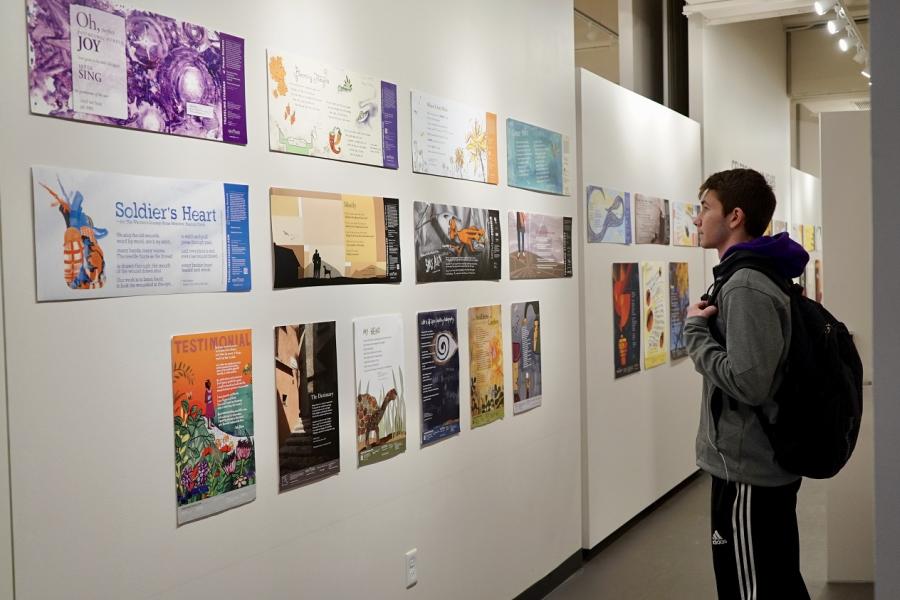Institutes and Initiatives

Chirality Research: Will This New Insight Help Make Better Materials or Pharmaceuticals?
Chirality, or the absence of mirror symmetry in a molecule, is a complex topic that Material Sciences Professor Torsten Hegmann is determined to know more about. Hegmann, director of the Advanced Materials and Liquid Crystal Institute, and other Kent State collaborators led an international collaborative research project with contributions from a global team whose paper about the efficacy of chirality transfer in Science Advances may provide insights to make better materials or pharmaceuticals.

Health and Well-Being of Students, Faculty and Staff Brought to Light by Healing Stanzas
Students across the nation were challenged as the pandemic swept the world. Healing Stanzas, a collaboration between the Wick Poetry Center, the Healthy Communities Research Institute and the Brain Health Research Institute, seeks to combine the science of brain health and public health with the creative energy of the humanities to provide Kent State students, staff and faculty with an opportunity to improve wellness through reflective poetry.

Kent State Graduate and Undergraduate Research Mentorship Awards Announced
Intentionality to build successful academic mentoring relationships with students is what sets professors apart at Kent State, and each year two professors at the graduate and undergraduate level receive a student-nominated award for their ability to do so. The intent of the award is to recognize those professors exceeding in mentoring students in how to perform research in any field.

Biophysics Professor Becomes the First Recipient at Kent State of an R35 Grant from the National Institutes of Health
The National Institutes of Health recently awarded a $1.86 million grant to Thorsten-Lars Schmidt to develop molecular tools that help researchers to understand membrane proteins. This is the first time a professor at Kent State has been awarded an R35, which provides promising researchers with a five-year funding for a broader research program, rather than funding a specific project. This gives investigators a lot of freedom to develop new research directions as opportunities arise, rather than being bound to specific aims of a more narrow study.

$850,000 in Funding Awarded for New Nursing School Technology from National Science Foundation
Intravenous (IV) needle insertion is a practice that many medical professionals learn and need to master. A new cross-departmental Kent State project in the works will help nursing students improve their skills with cutting-edge technology.

Climate Scientist Publishes Trends in ‘Weather Whiplash’ Events
Many wonder if climate change is the reason we’ve had 'weather whiplash' or day-to-day dramatic changes from hot to cold or cold to hot. As a climate scientist, Cameron Lee, assistant professor in the Department of Geography in the College of Arts and Sciences at Kent State, gets asked this question a lot. Looking beyond just the average temperatures and statistical means, he decided to take a more analytical look at weather whiplash and add to a growing body of climate change literature examining temperature variability trends.
Geography Researchers to Contribute to Actionable Science for Decision Makers
Timothy Assal, Ph.D., assistant professor in the Department of Geography, was awarded a grant as a co-principal investigator on a multi-institutional project, “Vulnerability of lower-ecotone aspen forests to altered fire regimes and climate dynamics in the northern Great Basin” (a three-year $299,842 total award with $89,600 going to Kent State), which is funded by the Northwest Climate Adaption Science Center. This collaboration includes the United States Geological Survey in Boise, Idaho, Utah State University, and the United States Bureau of Land Management.

Kent State’s Brain Health Research Institute Celebrates ‘Collaboratories’ Grand Opening
Kent State University’s Brain Health Research Institute celebrated the grand opening of its new lab spaces on Friday, Nov. 5, with an afternoon of activities that included a keynote presentation, space dedication, tours and student research demonstrations. The new space, featuring interdisciplinary research facilities, is located on the lower level of the Integrated Sciences Building on the Kent Campus.

Now ACCEPTing Students: Kent State Professors Receive HRSA Funding
Whether you are attempting to master the art of cooking or trying your hand at DIY home improvement, chances are books, blogs and articles have been written by many qualified experts to help guide the way. Scholars spend countless hours reading page after page - chapter after chapter to gain compreh…
College of Public Health Professor Partners With CHC Addiction Services for $2.6 Million Grant To Expand Opioid Treatment
Ohio’s opioid epidemic is one of the worst in the country. One Kent State University professor and his team are aiming to change that. Deric Kenne in the College of Public Health received a five-year, $2.6 million federal grant from the Substance Abuse and Mental Health Services Administration to expand and enhance services for opioid use disorder treatment in Summit County, Ohio. A significant portion of the funding will go to CHC Addiction Services to enhance and expand medication-assisted treatment programming.